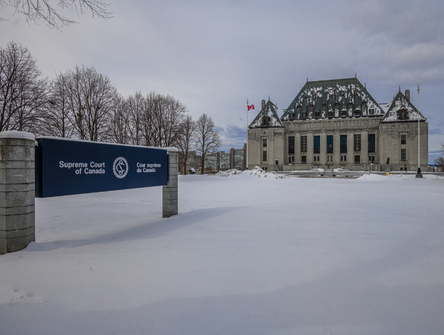Supreme Court enters an acquittal in wrongful conviction case
Despite a 5-4 split in reasons behind unanimous decision, there was no dispute Tammy Bouvette was victim of a miscarriage of justice

In a unanimous decision, the Supreme Court of Canada has ruled that a woman convicted in the 2011 drowning death of a toddler must be acquitted.
The Court clarified one of the routes of when an appeal court can enter such an acquittal and was split 5-4 in its reasons on whether the Court should engage in a framework discussion on a “discretionary acquittal.”
However, the fact that Tammy Bouvette has been at the centre of a miscarriage of justice was not in dispute.
The B.C. woman was charged with second-degree murder in the death of a 19-month-old she was babysitting. Bouvette pleaded guilty to criminal negligence causing death and was sentenced to 12 months’ imprisonment followed by strict probation. A later review by a special prosecutor found that the Crown had failed to disclose information that showed that an external review of the medical examiner’s conclusion was found to be unreasonable.
The B.C. Court of Appeal overturned Bouvette’s conviction, but declined to enter an acquittal, citing that there was evidence on the record on which a reasonable jury, properly instructed, could convict her, and thus entered a judicial stay of future proceedings. When Bouvette appealed to the Supreme Court, the Crown joined the call for the acquittal.
Writing for the majority reasons, Justice Nicholas Kasirer said that in view of the Crown’s position that if a new trial were ordered, it would call no evidence against Bouvette and that there would be no choice but to order an acquittal in the circumstances. With that in mind, the Supreme Court must make that order in the interests of justice.
“In this case, and instances like it, an appellate court can and should exercise its statutory authority to enter an acquittal forthwith given that the time, expense and uncertainties associated with a hypothetical trial on appeal need not be incurred,” Kasirer wrote.
However, he would not opine on whether Bouvette would also be entitled to an acquittal on a distinct, discretionary basis provided for in Section 686(2) of the Criminal Code.
“I am inclined to the view that this is not an appropriate appeal in which to consider the framework for discretionary acquittals or to set aside Truscott as the parties urge us to do,” Kasirer wrote.
“That case concerned circumstances, ‘outside of the norm’ (para. 259), that are markedly different from those of Ms. Bouvette.”
Writing for the concurring minority reasons, Justice Sheilah Martin felt that the Court should engage in the question of the framework.
“In my view, the context of this appeal allows the Court to reach sound conclusions,” she wrote.
“Crucially, it always remains the duty of the Court to fulfill its role of ensuring that the interests of justice are properly served. In the circumstances of this case, fulfilling this duty requires the resolution of an unsettled, but critically important, issue in this area of law.”
Martin said there was a compelling case for the Court to deal with the issue now rather than wait for another case that may never come.
“A lack of clarity about when to enter an acquittal to remedy a miscarriage of justice risks undermining the ability of courts to exercise this discretion in a principled and consistent manner and undercutting their responsibility to act as ‘guardian[s] of the justice system’,” she wrote.
Kyla Lee, of Acumen Law in Vancouver and past chair of the CBA’s Criminal Justice Section, says that on the one hand, it’s disappointing the Court didn’t deal with the discretionary powers to enter an acquittal. However, she is sympathetic to the majority’s reasoning that this was not the right case to come to a framework.
“You need to have a proper evidentiary foundation for an appeal court to decide an issue, especially one to engage the miscarriages of justice question,” she says.
“They’re right to say let’s wait for an appropriate case because it’s an extreme situation, the Truscott decision was extreme in and of itself, and we’d rather deal with this when it’s on all fours of what happened in the case, so fair enough.”
Lee agrees that the Crown's statement that they wouldn’t bring evidence if the case was retried was an admission they don’t think it’s in the public interest to continue the prosecution. She says it was the Crown’s fault Bouvette pleaded guilty in the first place, so their position was very principled in light of what happened in the case.
“It certainly would have been easily open to them to say that we know we messed up, but now that she’s got the full disclosure, we can start up again.”
Lee says the stigma that gets attached to a person starts when they’re charged. Even if there is an acquittal, which is preferable to a judicial stay, the stigma follows a person, particularly in a case like this.
James Lockyer, who was counsel for Innocence Canada as an intervenor in the case, says that while it was nice to see Bouvette get her acquittal, the question of when an appeal court can use its discretion to enter an acquittal after a wrongful conviction remains unanswered.
He says it's a shame the majority decided not to address that question.
“We’ll have to wait for another day, but the minority in their concurring opinion did spend a lot of time discussing it. If it becomes the law in the future, it will advance it in the right direction.”
Lockyer says that when a new trial is ordered in a wrongful conviction case, the accused must rely on the Crown not to offer evidence to secure an acquittal.
“That doesn’t happen so often,” he says.
“It’s much better that the decision is made by the impartial adjudicator rather than one of the parties to the case.”
Innocence Canada had been looking for better rules regarding when an appeal court should enter an acquittal, and Lockyer hopes the concurring reasons in this case can provide a roadmap.
“We have a strong body of judges, four of nine, who have given us a framework within which an acquittal should be entered. For the time being, the framework they’ve set up is one that an appeal court would likely follow in the future,” Lockyear says.
Lee appreciated that the Court engaged in the human element in this decision and noted Bouvette’s experience navigating the justice system.“It’s not difficult to see how this marginalized person, who was facing a bunch of other hurdles, pleaded guilty in the face of a case,” she says.
“So they’re not just recognizing the law. It is more informed by the personal experience that a person in the justice system faces than the law, and it’s nice to see the Supreme Court take that approach, and not just be a dry legal court.”


